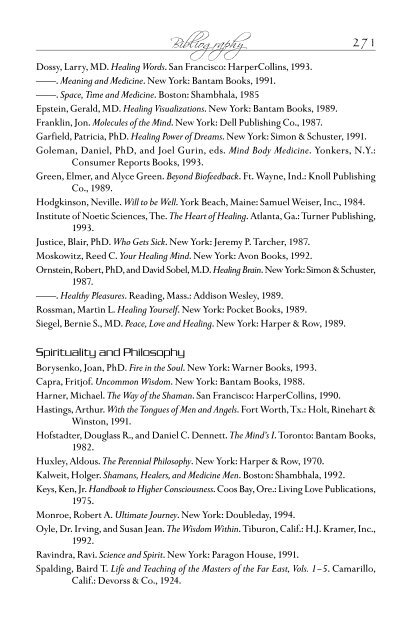edgar-mitchell
edgar-mitchell
edgar-mitchell
Create successful ePaper yourself
Turn your PDF publications into a flip-book with our unique Google optimized e-Paper software.
136<br />
The Way of the Explorer<br />
when viewed from a broader philosophical viewpoint. Three generations<br />
of physicists have used these interpretations with few questions, because<br />
quantum mathematics works like a cookbook recipe when applied to practical<br />
problems. Philosophy is not required. But the map is not the territory,<br />
and mountains still lie beneath the clouds even though the pilot can’t see<br />
them. It has taken several decades of experimental evidence to demonstrate<br />
what is required to restore a degree of coherence to the meaning of<br />
quantum mechanics. The fundamental message here is that mathematical<br />
descriptions are not embedded in nature, but are created by mind. The<br />
differences between existence and knowing must be carefully observed<br />
when considering the larger viewpoint.<br />
In the early days when scientific tools were relatively crude and simple,<br />
scientific observation and the measurement of results were a single event.<br />
Observation and measurement were, in a broad sense, synonymous. But<br />
today that’s no longer true.<br />
Take for instance the ancient philosophical question of whether a tree<br />
falling in the forest makes a sound if there is no one there to hear it. The<br />
mind game has a new spin today. The question must be answered differently<br />
with the availability of modern technology, particularly with the advent<br />
of remote recording devices. The falling tree creates a pressure wave,<br />
which a pressure-sensitive instrument can record if tuned to the proper<br />
frequencies. But that is neither hearing nor sound. Hearing and sound<br />
relate to the subjective experience of a living organism.<br />
However, according to quantum theory, if neither the person nor the<br />
device were there, one could not know or say what is happening with the<br />
tree and its pressure wave. By one radical interpretation, the tree doesn’t<br />
even exist unless it’s being observed. The beauty of the scientific method is<br />
that if we were to study many falling trees we might gather subtle clues as<br />
to what happens when trees fall, and then deduce what happens when the<br />
tree falls in the middle of the forest without an observer or a recording<br />
device. But is deducing the same as knowing It certainly isn’t the same as<br />
measuring.<br />
Einstein criticized quantum theory when he stated that God doesn’t<br />
play dice with the universe. In the metaphorical sense of the statement, he<br />
was wrong: The universe does indeed obey the rules of quantum probability.<br />
But with the knowledge we have today of the evolution of the universe,<br />
its species, language, and the thought process, it can be said that he was<br />
absolutely correct in the literal sense. God does not in fact play dice with<br />
the universe, because dice, the rules of probability, and even the meaning<br />
and nature of God are human creations of the last several millennia, and<br />
the universe is apparently several million times older than that. The subtle


